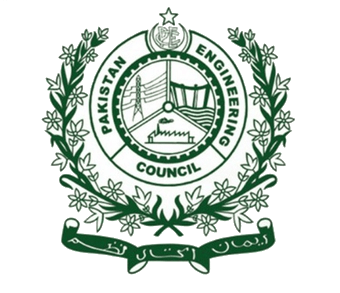PEC Profile Brief History
Brief History
Pakistan Engineering Council was established as a body corporate under an Act of the Parliament on January 10, 1976 for the regulation of engineering profession and education in Pakistan. This was achieved after a long drawn struggle waged by the engineering community and great deal of sacrifices. It was a landmark decision on the part of the Government, who piloted the bill leading to the Act.
The Council, with the approval of the Federal Government, made its byelaws in 1976 for carrying out the purposes of the PEC Act. Other landmarks include the framing of:
- The Code of Conduct for its members in 1978
- Regulations for Engineering Education
- Construction & Operation Engineering Works Bye-Laws 1987
- Engineering Regulation in Pakistan
The foundation stone of PEC Headquarter building in Islamabad was laid by Gen Muhammad Zia-ul Haq on 28 July 1987, and the HQ started its operations from this building on 14 Oct 1992 after its inauguration by then Prime Minister Mr. Nawaz Sharif.
In the course of establishment PEC opened branch offices in provincial capitals to facilitate its operations & public dealing:
- Karachi Branch Office is operating since 23th June 1987
- Lahore Branch Office since 30th Jan 1988
- Quetta Branch Office since 17th Feb 1988
- Peshawar Branch Office since 27th Mar 1988
- Multan Branch Office since 1st Jun 2016
- Hyderabad Branch Office since 1st Jun 2016
PEC also had established three Liaison offices for its assistance
- Sukkur Liaison Office was established on 18 Nov 1987
- Abbottabad Liaison Office
- Khuzdar Liaison Office
- Larkana Liaison Office
- Turbat Liaison Office
Ever since its establishment, 25 years ago, the Council has been untiringly serving the engineering profession. It has relentlessly followed and succeeded in establishing a forum within the country which serves the entire engineering community. PEC has always played a cooperative role and participated actively in Consultative and Advisory Committees/Boards constituted by successive Governments and provided necessary inputs in the decision making process.
Over the past quarter century PEC has grown into a mature professional regulatory body with an unblemished record. It is not too difficult to conceive the scenario in the country, had there been no PEC on the landscape. Not only the international recognition of our engineering degrees would have been perilously set aside, our own market would have been flooded with under and sub qualified engineers.
Pakistan Engineering Council in the supreme interest of the country has been trying hard to contest the Agreements entered into by the Government Ministries and various other Development Organizations with the International Financing Agencies which are overwhelmingly in favour of the foreign consulting engineering firms and construction companies and patently in violation of the PEC Byelaws. Furthermore, visualizing the implications of the conditionality of the WTO and GATS on our domestic services sector PEC prepared a position paper for taking policy decision by the Government of Pakistan.
The question of service structure for Engineers has been dragging on for long. The Council has been emphasizing adoption of the recommendations of the Civil Services Commission headed by Justice (Retd) S. Anwarul Haq made in 1979. We have continuously been pursuing the Government at all forums that the posts involving professional engineering works should be manned only by engineers qualified at tertiary level.
Over the years, PEC has become an effective bridge between the Government, industry and engineering universities/institutions and has been performing its functions in totally professional manner, a feature that needs to be jealously protected and safeguarded in the national interest.

